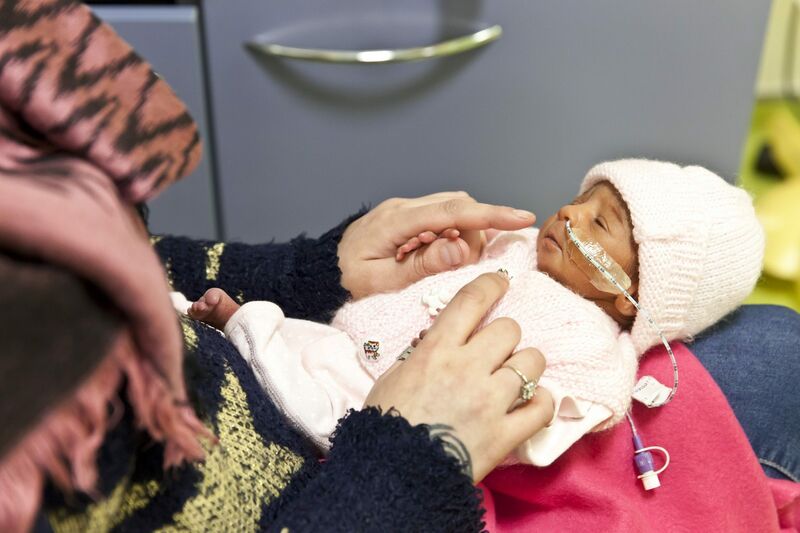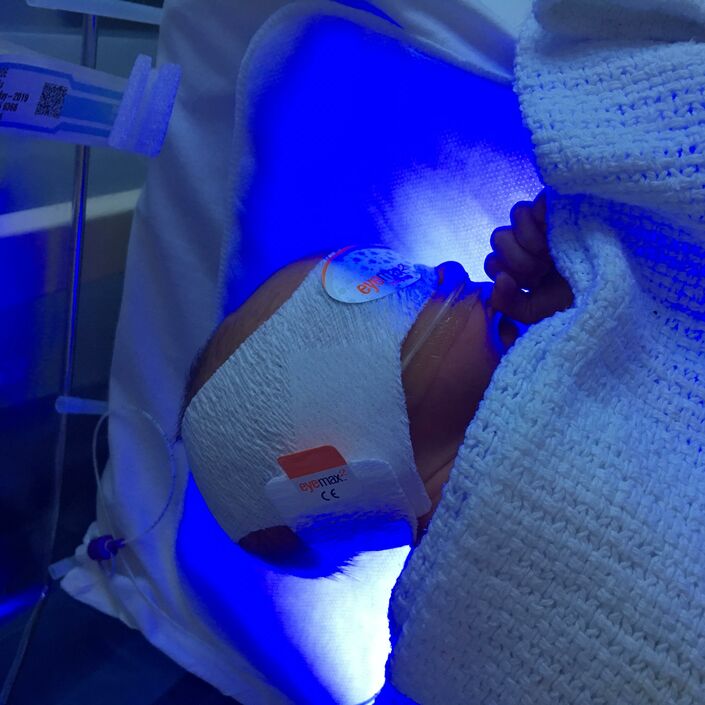We hope this reassures you that there is not one, straightforward feeding experience, and that every parent’s journey is different.
On this page, we will talk about the different types of nutrition that your baby might be fed in neonatal care. Breast milk provides the best nutrition and protection for your baby, but there are also reasons why your baby may need to be fed with other types of nutrition or need more support with feeding during their stay in neonatal care and beyond.
How to know if your baby is getting enough nutrition
You can be sure that your baby is getting enough nutrition if they:
- Have plenty of wet and dirty nappies (the consistency and amount will change as babies get older and depending on what they are fed)
- Are growing and gaining weight
- Are mostly settled and calm between feeds, if they are fed by tube, or are breastfeeding or bottle feeding.
Steady weight gain is a good way of showing that your baby is feeding and growing well. But all babies will gain weight at a different rate. This will be monitored during your baby’s stay on the neonatal unit and when you get home. Always talk to a member of staff on the neonatal unit if you have any concerns.
Parenteral nutrition (PN)
Some babies born very premature or sick will not be able to have milk straight away.
Parenteral nutrition (PN) is nutrition in a liquid form that is given directly into your baby’s bloodstream intravenously (through a vein). The solution has nutrients such as vitamins, minerals, carbohydrates, proteins and fats. It is called total parenteral nutrition (TPN) where it is used as the only source of nutrition.
Colostrum and first milk
The first milk that mothers produce is called colostrum. Colostrum is often thicker and more yellow in colour than breastmilk. It contains a rich mix of proteins, including antibodies that can help protect against infections. Colostrum comes in small amounts, but this will increase the more times you express. Some research has shown that introducing colostrum as early as possible to babies born premature or sick can reduce the time it takes for them to be able to feed successfully, and can reduce the risk of infections.
Breast milk
Breast milk is the best milk for nutrition, growth and development for all infants. It has many benefits, including the following:
- It boosts your baby’s immune system and protects against infections, such as gut and chest infections.
- It has antibodies from the mother that can protect your baby against bacteria and viruses.
- It can reduce the risk of your baby developing necrotising enterocolitis (NEC), a serious condition that can happen in babies born premature.
- It provides other nutrients, growth factors and hormones that help your baby grow and develop during the vital early months after birth.
- It improves brain development.
- It is very easy to digest and is absorbed more easily than formula milks.
Your baby may not be well enough or strong enough to breastfeed straight away. If this is the case, the staff at the hospital will help you to express (collect) your breast milk, as soon as possible after the baby’s birth. You can do this by hand or with a breast pump. There are other reasons why parents may express milk for their baby.
After expressing your breast milk, the milk can be frozen and stored until your baby is ready to feed. Expressed milk can also be given to your baby directly into their stomach using a feeding tube, which is useful if they are too unwell to feed from a breast or bottle. Breast milk can be given by bottle once your baby has learned to suck, swallow, and breathe on their own.
Expressing breast milk can take time to learn, and the staff looking after your baby will give you positive support and practical help with this. Try not to worry if you are not expressing a lot of milk at first. Speak to your midwife or feeding specialist on the neonatal unit for more support.
Supplements and fortifiers
Babies born premature or sick may also need extra vitamins and minerals for growth, so your baby may be given supplements to breast milk. Your baby’s doctor may prescribe a breast milk fortifier (which is usually a powder made from cow’s milk) which can be added to breast milk. This can help with growth and bone development.
If your baby needs more milk than is available, your baby’s doctor may prescribe donor breast milk or a formula (see below) for preterm babies, to be taken alongside your milk.
We have more detailed information about expressing milk and breastfeeding.
Donor milk
If you have a low supply of milk, or are unable to breastfeed, some hospitals can provide donated breast milk for your baby. Donor milk may be used for a baby who is at a high risk of necrotising enterocolitis (NEC), because they are very premature, or at a very low birthweight. This is because there is some evidence that donor milk can reduce the risk of NEC in premature babies when compared to formula milk. This makes it a good alternative to breast milk for these babies. However, donor milk is not as effective as mother’s own milk.
Speak to unit staff for more information, or if you have any concerns about receiving donor milk. They can also give you information about what to do if you have extra milk.
For more information about donor milk, visit the United Kingdom Association for Milk Banking (UKAMB) or The Human Milk Foundation website.
Formula
If you decide not to breastfeed or express your milk, your baby may be prescribed a special preterm formula designed especially for their nutritional needs.
This may be given by a feeding tube at first, but can be given by bottle once your baby has learned to suck, swallow, and breathe on their own. Your doctor will talk to you if they think your baby will benefit from a preterm formula milk. If needed, your doctor may prescribe your baby a preterm formula milk to be used at home.
Some parents may choose to feed their baby using a first infant formula. These do not contain the additional nutrients of preterm formula, but sometimes preterm formula is not needed or recommended. Formulas do not have the same benefits as breast milk for your baby, and does not provide protection from infection. Formula milk is also not as easy for your baby to digest as breast milk. However, formula may be the right choice for some families for other reasons.
If you feed your baby using formula, staff on the neonatal unit should show you how to make up feeds safely before you go home from the unit. The NHS website also has some information about this. On some units, staff may ask you to bring in your chosen formula (if not prescribed), but will supply you with sterile bottles and teats at first. In time, you may want to bring in your own bottles so your baby can start to get used to them.
We have more information about bottle feeding your baby.
Combination feeding
Some parents may feed their baby through a combination of breast milk and formula. This is often known as combination feeding. Combination feeding may be used if you are unable to produce enough milk, or are finding it difficult to breastfeed. Some parents choose to combination feed so that they can share feeds between them. Combination feeding may be something you had planned to do. But if this is not the case, don’t be hard on yourself if you combination feed for other reasons. Talk to a feeding specialist, your midwife or health visitor if you have any questions or concerns about combination feeding.


